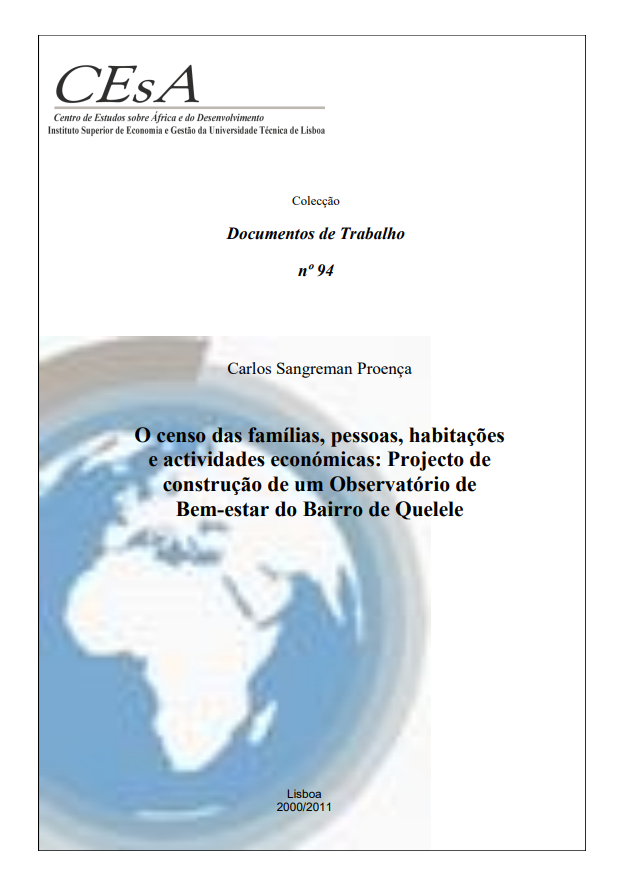Working Paper 94/2011: O censo das famílias, pessoas, habitações e actividades económicas: projecto de construção de um Observatório de Bem-estar do Bairro de Quelele

Title: Working Paper 94/2011: O censo das famílias, pessoas, habitações e actividades económicas: projecto de construção de um Observatório de Bem-estar do Bairro de Quelele
Author(s): Sangreman, Carlos
Publication Date: 2011
Publisher: ISEG - CEsA
Quotation: Sangreman, Carlos. 2011. "O censo das famílias, pessoas, habitações e actividades económicas: projecto de construção de um Observatório de Bem-estar do Bairro de Quelele". Instituto Superior de Economia e Gestão - CEsA Documentos de trabalho nº 94-2011.
Abstract: This work was carried out in pursuit of the objective of reinforcing the capacity of the living forces (today we would say “the agents”) of civil society in the Quelele neighborhood to intervene in order to achieve an increasingly better life, a level of higher welfare for the inhabitants. The theoretical basis is summarized in the book to be published in April by the OECD Development Assistance Committee (DAC), “DAC Guidelines on Poverty Reduction”, which starts from the multidimensional notion of well-being for a definition of poverty as deprivation of part of the or all of these dimensions. The author also assumes an active attitude towards the applied research outlined here. In other words, it does not consider itself as an external observer of a collective identity in formation, but rather as a small part of the express action of the various formal and informal institutions in the neighborhood so that this identity develops and asserts itself more and more clearly. This work would not have been possible without the work of the surveyors from the Quelele neighbourhood, who kept the bulletins they had already filled out throughout the period of the armed conflict, and used their knowledge of the terrain to carry out the survey in a very short period of time. Likewise, AD's IT staff learned to work with the statistical information program with ease, a sign that the country's human resources have evolved significantly. Thanks are all due to the people of AD, from its directors to the simplest members, as well as to Pedro Lonet Proença, who made available the photographs he took in the neighborhood, and to Cristina Duarte, who executed the panels for the exhibition to return the results enthusiastically and creatively.
Identifier: http://hdl.handle.net/10400.5/4623
Category: Working paper
Abstract:
O censo das famílias, pessoas, habitações e actividades económicas: projecto de construção de um Observatório de Bem-estar do Bairro de Quelele was carried out in pursuit of the objective of reinforcing the capacity of the living forces (today we would say “the agents”) of civil society in the Quelele neighborhood to intervene in order to achieve an increasingly better life, a level of higher welfare for the inhabitants. The theoretical basis is summarized in the book to be published in April by the OECD Development Assistance Committee (DAC), “DAC Guidelines on Poverty Reduction”, which starts from the multidimensional notion of well-being for a definition of poverty as deprivation of part of the or all of these dimensions. The author also assumes an active attitude towards the applied research outlined here. In other words, it does not consider itself as an external observer of a collective identity in formation, but rather as a small part of the express action of the various formal and informal institutions in the neighborhood so that this identity develops and asserts itself more and more clearly. This work would not have been possible without the work of the surveyors from the Quelele neighbourhood, who kept the bulletins they had already filled out throughout the period of the armed conflict, and used their knowledge of the terrain to carry out the survey in a very short period of time. Likewise, AD’s IT staff learned to work with the statistical information program with ease, a sign that the country’s human resources have evolved significantly. Thanks are all due to the people of AD, from its directors to the simplest members, as well as to Pedro Lonet Proença, who made available the photographs he took in the neighborhood, and to Cristina Duarte, who executed the panels for the exhibition to return the results enthusiastically and creatively.
Quotation:
Sangreman, Carlos. 2011. “O censo das famílias, pessoas, habitações e actividades económicas: projecto de construção de um Observatório de Bem-estar do Bairro de Quelele”. Instituto Superior de Economia e Gestão – CEsA Documentos de trabalho nº 94-2011.





